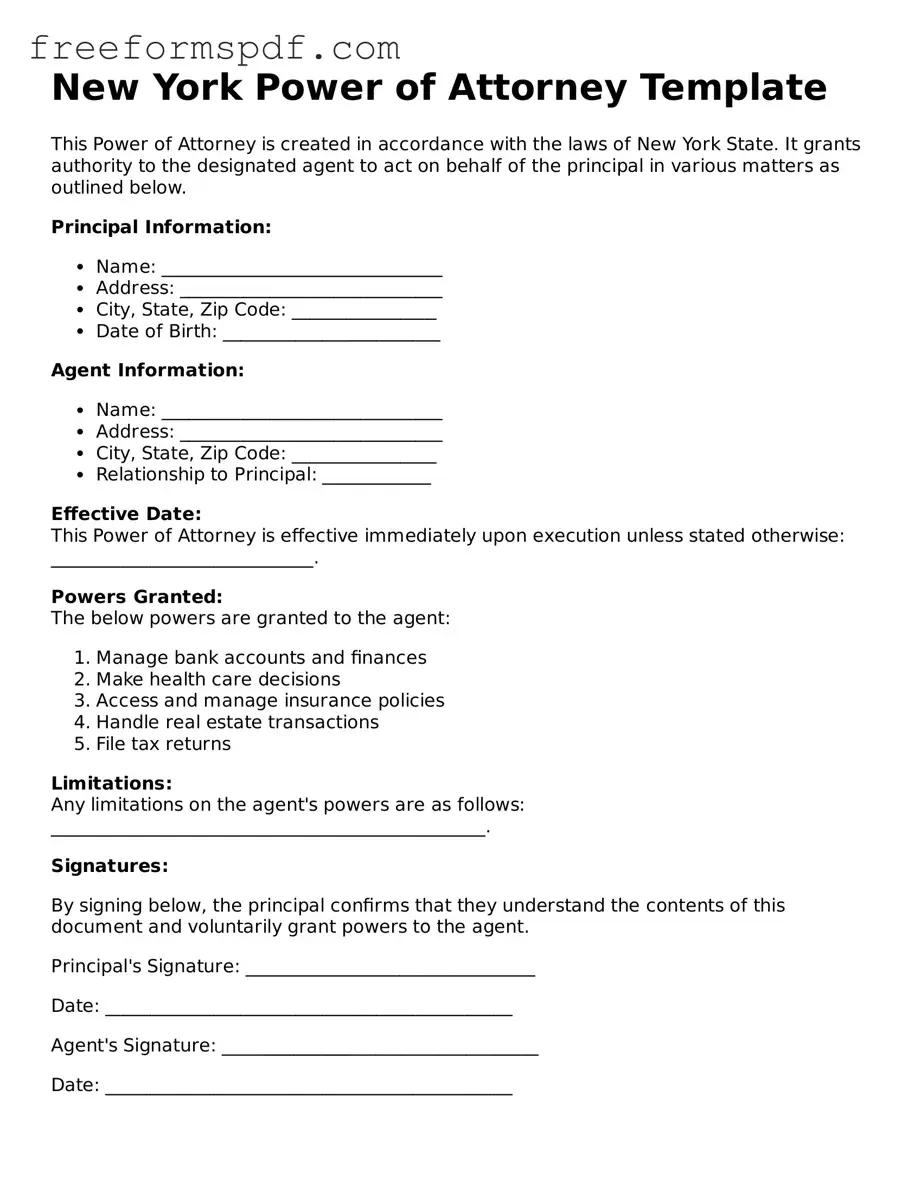Attorney-Verified Power of Attorney Document for New York State
Common mistakes
-
Not specifying powers clearly. When filling out the form, individuals often fail to clearly define the powers they are granting. This can lead to confusion or disputes later on.
-
Using outdated forms. It’s crucial to use the most current version of the New York Power of Attorney form. Using an outdated form may result in invalidation.
-
Forgetting to sign and date. A common mistake is neglecting to sign and date the document. Without these, the form may not be legally recognized.
-
Not having witnesses or notarization. In New York, a Power of Attorney must be signed in the presence of a notary public. Failing to do this can render the document ineffective.
-
Overlooking alternate agents. Some people forget to name alternate agents. If the primary agent is unable to act, this can create complications.
-
Not reviewing the document carefully. Mistakes in the details can lead to significant issues. It’s important to review the entire document for accuracy before submission.
-
Ignoring state-specific laws. Each state has its own requirements for Power of Attorney forms. Ignoring these can lead to problems with enforcement.
Learn More on This Form
-
What is a Power of Attorney (POA)?
A Power of Attorney is a legal document that allows one person (the principal) to grant another person (the agent) the authority to act on their behalf in financial or legal matters. This can include managing bank accounts, signing contracts, and making healthcare decisions.
-
Why should I consider creating a Power of Attorney?
Creating a Power of Attorney is important for planning ahead. It ensures that someone you trust can make decisions for you if you become unable to do so. This can happen due to illness, injury, or other circumstances. Having a POA in place can prevent confusion and disputes among family members.
-
What types of Power of Attorney are available in New York?
In New York, there are several types of Power of Attorney:
- General Power of Attorney: Grants broad powers to the agent to manage the principal's affairs.
- Durable Power of Attorney: Remains effective even if the principal becomes incapacitated.
- Springing Power of Attorney: Becomes effective only under certain conditions, such as the principal's incapacity.
-
How do I create a Power of Attorney in New York?
To create a Power of Attorney in New York, you must complete a specific form that includes your name, the agent's name, and the powers granted. The document must be signed by you and notarized. It is advisable to consult with an attorney to ensure that the document meets all legal requirements.
-
Can I revoke a Power of Attorney?
Yes, you can revoke a Power of Attorney at any time, as long as you are mentally competent. To revoke it, you should create a written notice of revocation and provide copies to your agent and any institutions or individuals that were relying on the POA. It is wise to consult an attorney to ensure the revocation is properly executed.
-
What happens if I do not have a Power of Attorney?
If you do not have a Power of Attorney and become incapacitated, your family may have to go through a court process to appoint a guardian. This can be time-consuming and costly. Having a POA in place helps avoid these complications and ensures your wishes are followed.
-
Can I limit the powers granted in a Power of Attorney?
Yes, you can limit the powers granted to your agent in a Power of Attorney. You can specify which actions your agent can take and which they cannot. This allows you to maintain control over your affairs while still providing assistance when needed. Be clear and specific in your instructions.
Misconceptions
When it comes to the New York Power of Attorney form, many people hold misconceptions that can lead to confusion. Here are four common misunderstandings:
-
Misconception 1: A Power of Attorney is only for financial matters.
While many use a Power of Attorney for financial decisions, it can also cover healthcare and other personal matters. You can specify what areas you want the agent to handle.
-
Misconception 2: The Power of Attorney is permanent and cannot be revoked.
This is not true. You can revoke a Power of Attorney at any time, as long as you are mentally competent. It's essential to notify your agent and any relevant institutions of the revocation.
-
Misconception 3: Anyone can be appointed as an agent.
While you can choose almost anyone, there are some restrictions. For example, the person must be at least 18 years old and mentally competent. It’s best to choose someone you trust completely.
-
Misconception 4: The Power of Attorney takes effect immediately and cannot be limited.
This is misleading. You can create a Power of Attorney that only takes effect under certain conditions, like if you become incapacitated. This is known as a "springing" Power of Attorney.
Some Other Power of Attorney State Templates
Does a Power of Attorney Need to Be Recorded in Pennsylvania - Instructions must be detailed to mitigate ambiguity in an agent's authority.
The Texas Real Estate Purchase Agreement form is essential for facilitating a smooth transaction between buyers and sellers in Texas, as it clearly delineates the responsibilities and rights of both parties involved. By utilizing this document, individuals can engage in negotiations with confidence, ensuring all aspects of the property sale are addressed. To properly initiate the transaction, you can access the Real Estate Purchase and Sale Agreement and fill out the required details.
Durable Poa Form - This form can serve as an essential tool in your estate planning strategy.
